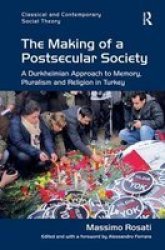Description
The book discusses how Turkey has transitioned from a secular society to a more Anglo-Saxon perspective, and how this transition has implications for Europe.
Drawing on the thought of Durkheim, this volume focuses on societal changes at the symbolic level to develop a new conceptualisation of the emergence of postsecular societies. Neo-Durkheimian categories are applied to the case of Turkey, which in recent years has shifted from a strong Republican and Kemalist view of secularism to a more Anglo-Saxon perspective. Turkish society thus constitutes an interesting case that blurs modernist distinctions between the secular and the religious and which could be described as 'postsecular'. Presenting three symbolic case studies - the enduring image of the founder of the Republic Ataturk, the contested site of Ayasofia, and the remembering and commemoration of the murdered journalist Hrant Dink - The Making of a Postsecular Society analyses the cultural relationship that the modern Republic has always had with Europe, considering the possible implications of the Turkish model of secularism for a specifically European self-understanding of modernity. Based on a rigorous construction of theoretical categories and on a close scrutiny of the common challenges confronting Europe and its Turkish neighbour long considered 'other' with regard to the accommodation of religious difference, this book sheds light on the possibilities for Europe to find new ways of arranging the relationship between the secular and the religious. As such, it will appeal to scholars of social theory, the sociology of religion, secularisation and religious difference, and social change. Review: 'In this posthumous work, Rosati turns received wisdom on its head and makes the case for Turkey as a truly post-secular society - and one Europe would do well to study and learn from. He allows us to envision the growth of a true pluralism of nations, ethnicities, religiously obliged and secular individuals and a cultural diversity that gives new meaning to the concept of neo-Ottomanism.'Adam B. Seligman, Boston University, USA and Director of CEDAR - Communities Engaging with Difference and Religion
